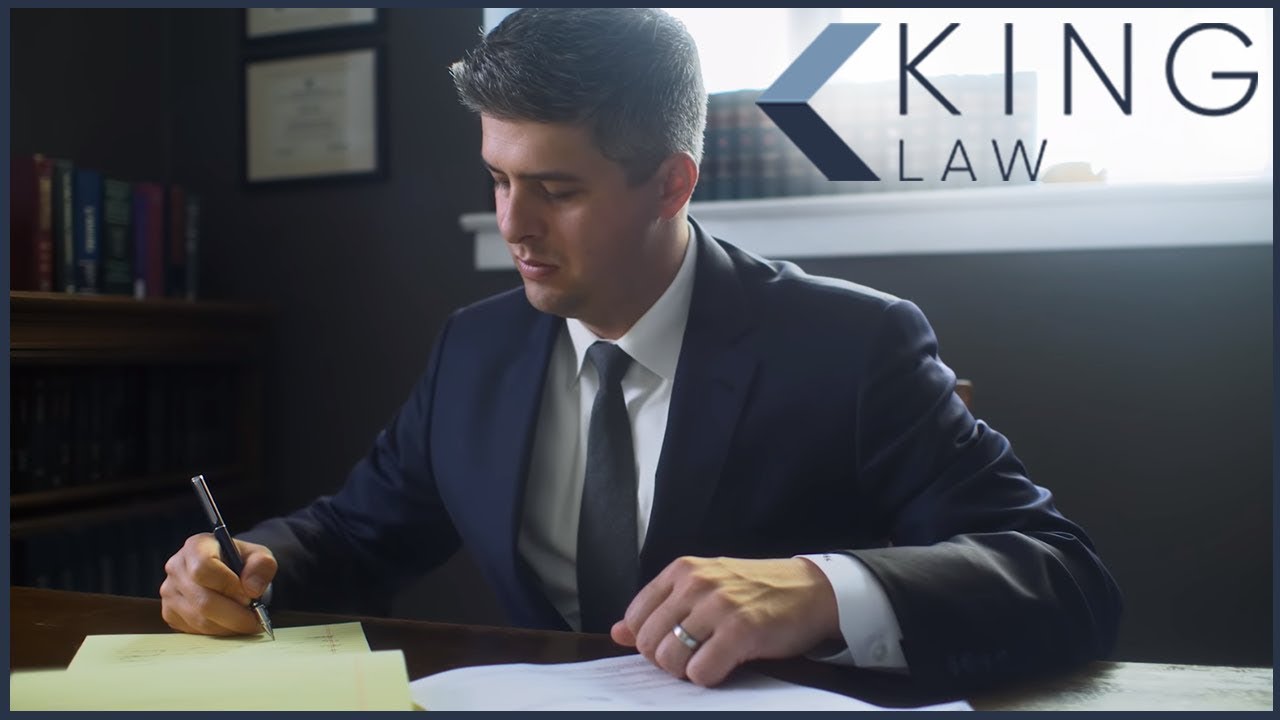
Criminal Defense Attorneys in Rochester, NY
Finding a criminal defense lawyer to represent you in Rochester, New York, can be a daunting task, especially when you are facing serious charges that have life-altering consequences. At King Law in Rochester, New York, we have the experience, passion, and grit that it takes to make sure that does not happen. Our team of experienced lawyers is prepared to take charge, so that you do not have to. With decades of combined years of experience practicing criminal law, King Law has earned a reputation in the Rochester area for being one of the most prepared, strategic, and aggressive criminal defense firms in the city. With this amount of experience, there is no case too large or too complex for us to handle. Surely our results speak for themselves.
All of our criminal defense attorneys were born and raised in the Rochester area. Robert King grew up in Wayne County and graduated from Wayne Central High School. He earned his undergraduate degree locally at St. John Fisher College. Mr. King spent several years working as an assistant district attorney in Monroe County where he was promoted to the Special Victims Unit. During his time with the Monroe County District Attorney’s Office he successfully took more than Thirty trial to verdict. Since establishing his private criminal defense practice in Downtown Rochester in 2013, the firm has represented thousands of clients facing charges ranging from minor misdemeanors to extremely serious cases of murder, drugs, and guns, including those in Federal court.
Jerry King, also a Rochester-area native, graduated from Wayne Central High School and earned his undergraduate degree at St. John Fisher College. He spent 2 years as a prosecutor in Schuyler County, 2 years in Steuben County, and 2.5 years in Ontario County. Jerry worked on a variety of cases, including traffic matters, violation-level offenses, misdemeanors, and felonies. Jerry handled thousands of cases during his time as a prosecutor and gained valuable experience with strict discovery requirements, bail reform, motion practice, hearings, trials, and sentencing. Jerry transitioned to a criminal defense lawyer in 2021 handling cases in both Rochester, New York, as well as surrounding counties.
Greg Colaveccia was born in the Rochester area and graduated from Gates-Chili High School before earning his bachelor’s degree at the University of Rochester. Mr. Colavecchia spent several years as a Monroe County prosecutor where he was promoted to the Major Felony Bureau prosecuting more than 300 violent felony offenses.
He moved to the Economic Crime Bureau where he prosecuted felony-level white-collar crimes including forgery, embezzlement, grand larceny, and counterfeit money cases.
Criminal cases in Rochester, New York, are prosecuted by the District Attorney’s office in the county in which the crime was committed. For example, criminal arrests in the City of Rochester are prosecuted by the Monroe County District Attorney’s office. Federal cases that occur in Rochester will be prosecuted by the United States Attorney for the Western District of New York.
With King Law on your side, you can expect to receive fierce representation that refuses to compromise your rights. Regardless of your guilt or innocence, you can be sure that we will provide the best defense we can to resolve your case in the most favorable way possible.
Our Rochester office is centrally located in the heart of the city, next to the Monroe County Office building. Our Address is 650 Clinton Square Rochester, NY 14614. We are also available by phone 24 hours a day at (585) 270-8882. Feel free to drop in or give us a call.
Types of Criminal Defense Services
Whether you are charged with a crime, or suspect that you may soon be, our experienced team of attorneys are standing by ready to fight for you. Because we take every case seriously, regardless of the charges pending against you, you can be confident that King Law is committed to resolving your case with your best interests in mind. Since every criminal case is different and surrounded by a unique and particular set of factual circumstances, we make it our business to obtain and analyze every shred of evidence we can. This is what sets us apart. Rather than recycle the most popular legal defenses, like other criminal lawyers do, we work diligently to carefully construct the very best personalized defense strategy that is right for you.
We have represented thousands of clients who have been charged with everything from traffic violations to murder. The following list of criminal charges we have experience defending:
Our Team of Criminal Defense Attorneys
Our team of criminal defense attorneys in Rochester, New York, advocates for our clients through some of the most difficult moments of their life. Each member of our team at King Law stakes their reputation on delivering successful and tailored legal strategies to meet the needs of our clients. For 5 consecutive years, firm founder, Robert King, has been acknowledged as a Super Lawyers Rising Star – an honor only achieved by 2.5% of attorneys in the state of New York. This recognition is, no doubt, due to Mr. King’s high level of experience, achievements, and long track record of favorable results. Each attorney in our criminal law practice has experience as a prosecutor. And, we use this experience to our advantage. Because we have an intimate understanding of how criminal charges are filed, pursued, and prosecuted, we also know the strengths and weaknesses of these practices. We know exactly the sort of information prosecutors don’t want us to know. This knowledge can only serve to benefit you and protect you against any unlawful or unethical practices.
How We Handle Your Criminal Case
As soon as you contact our office, a member of our team will ask you some general questions about you and your case. This will likely include your name, contact information (phone number & email), date of birth, and a brief description of your circumstance that includes any criminal charges you may be facing.
Once this information is gathered our attorneys may ask to speak with you for a free consultation in order to determine whether or not the circumstances of your case require representation. Having assessed the gravity of your case, your attorney can begin to explore the options that may be available to you. After these conversations are had, and both you and the attorney agree that our representation will provide you with the help you need, we will start working on your case immediately. Because defense lawyers need to move fast in order to secure all the evidence they need, we will not waste any time before we begin fighting for you.
Our office prides itself on the work it does to uncover critical facts about your case that other attorneys might easily overlook. We do this because evidence that may seem insignificant to others often plays an essential role in the criminal process that follows. Because the consequences of receiving a criminal conviction can be devastating, we are not willing to take any chances. Certainly the same could not be said about other lawyers or law firms that practice in the Rochester area.
What you should Know

Given the extremely high degree of ineffective assistance of counsel arguments raised on appeal, making sure you retain effective representation from the outset is imperative. Many individuals find out too late that the attorney representing them throughout the initial stages of the criminal process missed out on critical information, failed to properly advise them of their rights, or neglected to pursue alternate strategies that could have completely changed the outcome of their case. For this reason alone, making sure you have components and effective legal representation should not be taken lightly. After all, it is not uncommon for routine practices like searches and seizures, interrogations, and photo arrays to be conducted illegally or unethically. Therefore, seeking out the guidance of qualified and experienced legal counsel should be done immediately. If you have been subjected to any of these situations, our experienced team of Rochester criminal attorneys can provide you the help you need.
Contact Our Criminal Defense Law Firm in Rochester, NY
Our law firm is conveniently and centrally located in the heart of downtown Rochester, NY. The Law Office of Robert King is located at 650 Clinton Square, Rochester, NY 14614. We can also be reached by phone, 24 hours a day, at (585) 270-8882. Don’t hesitate to give us a call today.
Criminal Defense FAQs

How do I know when to contact a criminal defense lawyer?
When it comes to criminal matters, you should never hesitate to call an attorney. Because the direction of a criminal case can change drastically within a matter of hours, contacting a skilled criminal defense lawyer should always be a priority. It is far too risky to attempt to navigate the criminal legal process on your own. Oftentimes it is easier to avoid an arrest with adequate representation rather than attempting to undo an arrest after the fact. Attempting to accomplish either one of these things on your own is significantly harder. Securing legal representation at the outset is almost always in your best interest.
What types of punishments am I facing?
No two criminal cases are exactly the same. And, since punishments are designed to be a reflection of the criminal offense. It would stand to reason that punishments also vary to a great degree depending on a multitude of factors. While some criminal offenses require serving a term of incarceration, others can be settled with a minor fine and fee. Indeed, still others may be completely disposed of. In order to determine what sort of punishment you might be facing, you should speak with an attorney so that they can first evaluate the circumstances of your case.
How long will my criminal case take to resolve?
Unfortunately, the answer to this question is also highly dependent on the circumstances of your case. Since every criminal case is unique, the length of time it takes to resolve each case is highly variable. In determining the length of time it takes to resolve a criminal matter it is important to recognize that it is the court, and the court alone, that is in charge of scheduling criminal matters for appearances. The period of time it takes to resolve these cases, then, hinges upon how busy the court’s docket is at the time your case comes before it is to be heard. With this consideration, there is no expected length of time it takes to resolve any given matter. Therefore, your case could be resolved in a matter of days, weeks, months, or even years. In an effort to reduce this time, it is usually in your best interest to make sure that the attorney you choose to represent you is organized and prepared so they do not cause any unnecessary delays. Our average criminal case takes between six months and a year to complete.
How much does it cost to hire a lawyer to represent me?
Although most lawyers avoid answering this question, our attorneys at King Law do not shy away from tough questions. The reason most lawyers refuse to answer this question up front is because attorneys’ fees are dependent on the complexity of each case, the seriousness of the charges at hand, where the person is being charged, and whether the charges were brought in federal or state court. Even the amount of experience the attorney has in the subject area is a factor to consider. Unfortunately, there is no clear answer since the details of every case need to be fully understood by the attorney first, before a fee for their time, resources, ability, and experience can be given. Our average misdemeanor charge is between $2,500 and $7,500, and most felonies are $7,000 to $25,000. Give us a call for a free consultation to discuss your unique circumstances.
Don’t Take Our Word For It
Hear Directly From Our Past Clients
“King Law Firm was a true lifesaver. From reception to the courtroom, their exceptional support, care, and remarkable skills resulted in a successful case dismissal for my family member. They truly treated us like family.”
“I highly recommend this law firm. Mr. King is an exceptional lawyer in Rochester. I witnessed his impressive defense skills firsthand. Not only is he highly competent, but he’s also approachable and honest.”
“After my mother’s accident, contacting Robert King Law was the best decision we made for her recovery. From the start, their professionalism, responsiveness, and attention to detail impressed us. They treated my mother like family and settled the case quickly. We’re grateful to Robert King Law for making her recovery easier.”
“If you want the best then Robert King is your man.”
“Mr. King changed the trajectory of our lives for the better vs. what could have been a terrible outcome.”
“He got an unbelievably great verdict in an impossible situation!”
No case is too complex for Attorney King. Some of our results include:
Assault in the First Degree – Dismissed
Aggravated DWI with .37 BAC – Reduced to a fine
Rape in the First Degree – Dismissed
Harassment & Child Endangerment – Dismissed
Possession of Heroin & Cocaine – Dismissed
Contact a Criminal Defense Lawyer at King Law to Protect Your Rights
Are you considering speaking with a criminal defense attorney regarding your case? Now is the time to contact King Law and retain the representation of an aggressive and highly experienced lawyer. The firm can investigate every element of your case to ensure that your rights were never infringed upon during the arrest or investigation.



CASE RESULTS
OUR RESULTS SPEAK FOR THEMSELVES.
Criminal Sale of Marijuana
Result - Dismissed
Rape in the First Degree
Result - Dismissed
Pedestrian Accident
Settlement - $105,000
